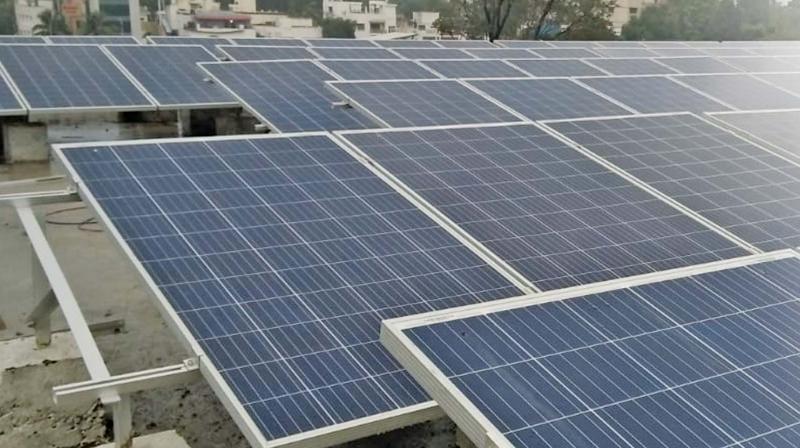Chennai: Only a few independent houses have rooftop solar panels in city
The per capita consumption, however, continues to grow at an exponential rate.

Chennai: Chennai has the second largest number of rooftop solar panels on apartments in the country, but has the least number of independent houses fitted with rooftop solar panels, according to a study conducted by the World Resource Institute (WRI).
The paper, discussed at a two-day conference organised by the Centre for Science and Environment (CSE), a Delhi based think tank, says that of the total of 1,808 households surveyed in five cities - Nagpur, Jaipur, Chennai, Chandigarh and Bangalore - Chennai had the second largest number of rooftop solar panels on apartment buildings. However, the number dropped significantly for independent houses.
“The problem could be because of ownership. Of the houses we surveyed it’s possible that the building was not owned by the tenant,” said Bharath Jairaj, Energy Director at WRI.
The problem in Chennai could also be that the net metering is an incredibly slow process, Jairaj said. “The metering guy plays hardball we’ve noticed and so it takes time.”
Rooftop solar requires proactive consumer engagement. “There is a lack of clear, credible and easily accessible sources of information and an absence of customised financial offering, which makes the experience really confusing,” Jairaj adds.
Chennai has the potential to harness enough solar energy to reduce demand by at least 20 per cent, says a report by Greenpeace India and Gujarat Energy Research and Management Institute (GERMI).
The report titled ‘Rooftop Revolution: Unleashing Chennai’s Rooftop Potential’ found that the total rooftop potential of the city is 1,380 Megawatts (MW) and that at least 46 per cent can come from residential areas.
As of today, the Grid Connected Rooftop and Small Solar Power Plants Programme, which encourages the installation of rooftop solar systems does not have enough takers or support in the country.
‘If deployment rates do not significantly increase, it is unlikely that India’s rooftop solar target of 40GW by 2022 will be met. Chennai, by virtue of being a Tier-I city, is representative of most locations in India from where the most demand of rooftop solar is likely to arise,’ the report said.
At the same time, the Chennai Metropolitan Development Authority is required to make changes under the Tamil Nadu Town and Country Planning Act to make it mandatory for all multi-storeyed buildings to harness grid-connected solar energy, which has not been implemented yet.
The per capita consumption, however, continues to grow at an exponential rate. This measure could reduce the dependence on thermal power stations, believe experts. “Switching to solar will not only help Chennai reduce air pollution by bringing down its dependence on coal as a source of power, but also help policymakers, planners and installers in Tamil Nadu contribute to India’s overall rooftop solar PV goal of 40 GW by
2022, which is crucial for India’s voluntary contribution to the Paris Agreement. We need the state government of Tamil Nadu to make it easy for residents of Chennai to adopt rooftop solar PV,” said Pujarini Sen, Climate & Energy Campaigner, Greenpeace India.

